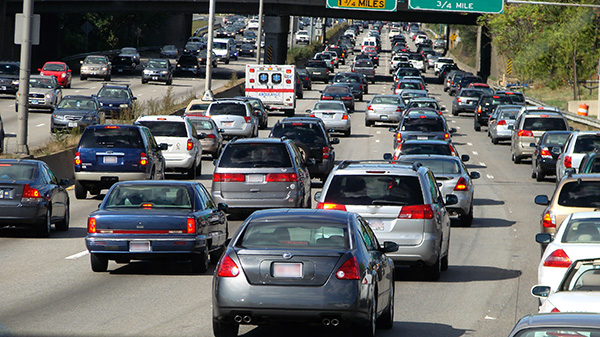
Few things are as frustrating as seeing your car's temperature gauge creeping toward the red zone while you’re stuck in traffic. If you’ve ever been in this situation, you know how nerve-wracking it can be. But why does your car overheat in traffic and not while cruising down the highway? The truth is that several factors can cause your car to overheat, especially when you're sitting in bumper-to-bumper traffic where the car’s cooling system is put to the test. Understanding these causes is key to preventing bigger issues down the road.
1. Insufficient Airflow to the Radiator
One of the primary reasons why your car may overheat in traffic is the lack of sufficient airflow to the radiator. When your vehicle is moving, air flows naturally through the grille, helping to cool down the engine and regulate the temperature. However, when you’re stuck in traffic, the lack of forward motion means your engine can’t rely on external airflow to stay cool.
What can cause this?
Your car's cooling fan is designed to keep the air flowing through the radiator when you're at a standstill. If the fan is faulty or not working efficiently, the radiator will struggle to maintain optimal temperatures, leading to overheating.
How to fix it:
Make sure your cooling fan is working properly. If you hear strange noises or notice that the fan isn’t kicking on when the car heats up, it might be time for a repair or replacement.
2. Low Coolant Levels
Coolant plays a critical role in keeping your engine temperature in check. It's responsible for circulating through your engine and absorbing heat. However, if the coolant levels are low, the system won't have enough fluid to keep your car cool, especially when you're idling for extended periods.
What can cause this?
Several factors can contribute to low coolant levels, such as a leak in the cooling system, a damaged radiator, or even a faulty water pump. Over time, wear and tear can also cause your coolant levels to drop.
How to fix it:
Regularly check your coolant levels, especially before long drives or during hot weather. If you find that you need to top off the coolant frequently, it's likely you have a leak or another underlying issue that needs to be addressed by a professional.
3. Thermostat Failure
The thermostat is a small but vital component that helps regulate the flow of coolant through your engine. It opens and closes based on the engine’s temperature, ensuring that coolant circulates as needed to maintain an optimal temperature.
What happens if the thermostat fails?
If the thermostat gets stuck in the closed position, the coolant won’t circulate through the engine, causing it to overheat. This is especially noticeable in traffic, where the lack of airflow already puts added stress on the cooling system.
How to fix it:
A thermostat that’s stuck closed should be replaced immediately. It’s a relatively inexpensive fix, but ignoring it can lead to severe engine damage over time.
4. Clogged Radiator or Cooling System
Over time, your car's cooling system can accumulate dirt, debris, and other particles that reduce its efficiency. A clogged radiator or hoses can restrict the flow of coolant, making it difficult for the system to properly regulate the engine temperature.
What can cause this?
Aging coolant can also lead to sludge build-up, which clogs the radiator and other components of the cooling system. If the radiator is clogged, the cooling system can't function effectively, especially in stop-and-go traffic.
How to fix it:
Flushing your radiator and replacing the coolant periodically can help prevent build-up. If your radiator is severely clogged, a professional cleaning or replacement may be necessary to keep your car running cool.
5. Faulty Water Pump
The water pump is responsible for circulating coolant through the engine and radiator. If the water pump isn't functioning correctly, the coolant won't circulate as it should, causing your car to overheat.
What can cause this?
A failing water pump is often caused by wear and tear over time. Symptoms of a failing water pump can include coolant leaks, strange noises, and of course, overheating. If you suspect your water pump is on its way out, it’s important to address the issue before it leads to more extensive damage.
How to fix it:
If the water pump is faulty, it will need to be replaced. Regular maintenance checks can help catch water pump issues before they lead to overheating problems.
Preventing Overheating
Now that you know the potential causes of overheating, what can you do to prevent your car from overheating in the first place?
Keep an eye on your temperature gauge
If it starts to creep up while in traffic, switch off the air conditioning and turn on the heater. It may sound uncomfortable, but the heater draws heat away from the engine and can help lower the temperature until you’re able to move again.
Avoid extended idling
If you're stuck in a long traffic jam, consider turning off your engine to prevent unnecessary strain on the cooling system.
Regular maintenance
Don’t wait for overheating to happen before you check your car’s cooling system. Routine checks on coolant levels, the radiator's condition, and the cooling fan's functionality can prevent major issues.
Don’t wait until your car overheats! Get a full cooling system inspection at Kwik Kar Auto Repair – Belt Line today. Our team will make sure your vehicle is ready for the demands of city traffic and beyond.